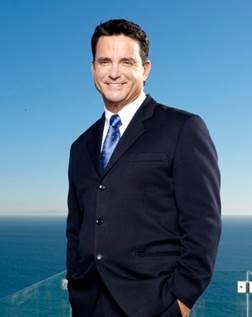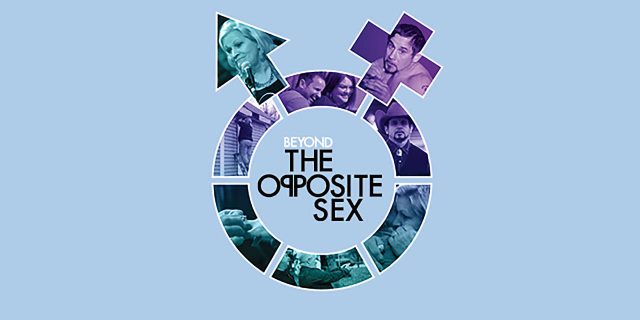We live in a moment of profound change in attitudes and understanding of transgender issues. Much as moved on since Emmy Award winner Bruce Hensel first introduced viewers to the stories of two people going through gender affirmation surgery, with 2004’s The Opposite Sex.
16th March saw the broadcast of follow-up Beyond the Opposite Sex, which picks up the story of Rene and Jamie 14 years on, showing that the surgeries were far from the final part of their journey.

Intensely personal, honest and uncompromising the documentary opens up the human elements and tribulations of an issue that needs more understanding for us to progress.
Hensel gave Bloop some time to discuss the issues at the heart of his new work:
What made you want to go back to the stories of Rene and Jamie?
Changing the world. I thought it was important, nobody had done it before, about what happens after. We wanted to show what happens after the transition, how it’s like living in Middle America as a transgender person.
What was your original motivation to tell this story?
First of all, I’m certainly a unique individual myself. I’ve been lucky not to be a traditional journalist or producer. I have to give credit for the idea to my partner, Stuart Krasnow. Nobody had followed any transition from the beginning to years after the transition, so I thought that as a journalist and a producer, I could tell the story differently. It’s about understanding the spectrum of different attitudes, feelings, and genders.
It’s not about sex, it’s not about who you want to sleep with, it’s about who you want to sleep as. Staying in touch with these two brave individuals who want to tell the story that nobody else has, which is what happens. Do they regret it? How are they accepted in the world? What’s it like now? and I think that’s what BEYOND THE OPPOSITE SEX does.
What has changed in their lives since the original documentary?
Rene was divorced by the woman he loved; part of her motivation for that may have been because they couldn’t have children. Jamie also experienced great flaws; divorcing his then wife and leaving his daughter and wife and going out and finding men that she can tell about the change and the gender affirmation surgery as it’s now called, so it was about a great deal of loss.
In the original documentary, we talked about the journey and getting what they’ve always wanted which was the surgery but was also love. The third movie, BEYOND THE OPPOSITE SEX was about showing the love and the new gains.
What has changed for Transgender people in the US since the original documentary?
Well, a great deal has changed and a great deal has not changed. When I pitched it to Showtime, they pointed out that many of them had kids in junior high and high school who, like Jamie and Rene, were wanting to be considered transgender. So what has changed is that there are a lot more people who know about it. There’s a lot more acceptance but there’s still a lot of prejudice.
I want to point out that Jamie and Rene both don’t feel that after the gender affirmation surgery they are transgenders; once they have completed the transition, they believe they are a woman and a man. There are different opinions on that, but they feel strongly about it. I feel a great deal has changed but a great deal still needs to change.
What has working on these docs done for your personal approach to and understanding of transgender issue?
Well, I believe I always had a great understanding. Partially because I understand that we are all females in our mothers as foetuses until three months of age. At that point if the testosterone shoots up, we turn into males and if not we remain females. Then chemical, genetics, social—a lot of things play a role here. I have more of an understanding of the chemistry, but I believe I am very un-judgmental and I believe that working on the documentary has not changed a great deal of my whole understanding; however, of the individuals.
I truly believe Rene felt that and Jamie felt that but I believe as the case in all sexuality and gender that it’s a spectrum. Some heterosexuals are not healthy, some are. Some gay and lesbian individuals are healthy and some are not. The major thing that’s changed is that it’s about the individual.
How does the medical industry in the US view transgender issues? Is it doing well enough?
Well enough? Probably not. Certainly the doctors who perform the surgery understand it and I want to point out that many transgender people do not feel they need the full surgery. I think they must understand this better, that it’s an individual decision. But I think more progress has to come.
Why do you think so many in society are scared of transgender people?
People are scared of things that are different from them. It is that simple. Again, people in Middle America can have attitudes that protect them from thinking about things that are different from themselves; very religious fanatics are even more judgmental about that. I think that anything that’s different from us fights and judges our own identity.
Those who are more comfortable with their own identity are less frightened. I should point out, gender and sex are very different. Gender is about who you think you are, sexuality is about who you are attracted to; and I should point out that people who are attracted to the same sex, that has nothing to do with gender. So it’s not about that; it’s about who they feel they are. I think fear is about not knowing and wanting to think that you understand everything and defending yourself. I think there’s less of that, but I still think we have a long way to go.
What do you think people can do to understand the situation for transgender people?
I think they need to understand much of what I talk about, that there’s a spectrum to understand that everyone is different. I think they need to understand that some people feel very strongly this way; are all transgenders happy, no. Are all heterosexuals healthy, no. But I do believe that there are many, including Rene and Jamie, who feel strongly about who they are. I think acceptance is what it’s about. I think that’s what people need to understand.
What is meant by ‘Beyond’ in this context? Does it mean you think we have moved on from the issues in the original documentary?
It definitely means that; I think we’ve moved beyond the issues of the original documentaries which were about the transition, the gender affirmation as it’s called now. But BEYOND THE OPPOSITE SEX, a lot of transgender people including Jamie and Rene object to the title because it’s not about sex it’s about gender. But when you’re setting a tone, you need to make something that draws attention. I have no doubt that the “Beyond” is about life now rather than just about the transition, I think nobody’s done that until now.
Do you think there is light at the end of the tunnel for transgender people?
Is everybody accepting of transgender people, no. I doubt everyone will be accepting of them. More and more are, so I think we are moving toward that point but as you know from the laws and the prejudices we have a lot of road to cover.
Has the rise in conservatism in the US had an effect on transgender people? We get a certain view of Trump style politics over here in the UK, has it made a difference?
I don’t think it’s made as much of a difference as a lot of people think because I think a lot of people don’t understand the reaction. We shot in Brownsville, Texas which is very close to the Mexican border and many people there voted for Trump; many Hispanic people voted for Trump. Now, without throwing judgements about this, I think there’s been a rise of conservatism in the middle of America and there’s more hate and prejudice, but I think on both coasts there is a lot more acceptance of transgender people than there used to be.
I don’t think that Trump is having the affect that some people think. I think we are moving forward, I think there are strong opinions in middle America and on both coasts. I don’t believe they are going to put out the light at the end of the tunnel as long as we have individual talk; but if we’re right and it’s about individual understanding and accepting other points of view, then we are making progress.









